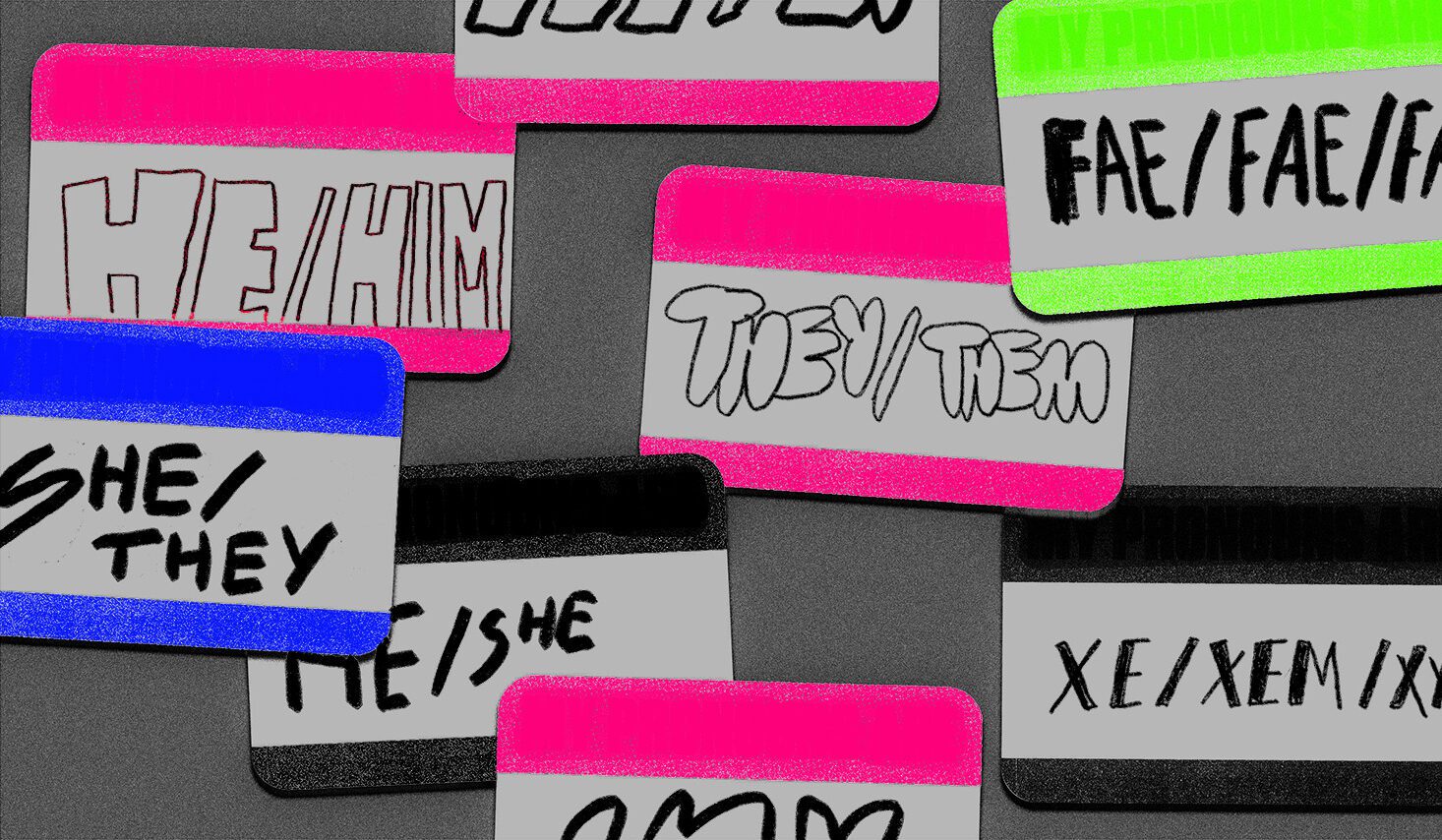
Back in 2019, dictionary publisher Merriam-Webster announced “they” as their word of the year. This was a nod to the pronoun’s expanding use: originally used to refer to individuals in the plural, it’s increasingly used by non-binary people who identify with neither “she” nor “he”.
Sounds simple, right? Well, in the years since, the seemingly uncontroversial subject of pronouns has become something conservative-leaning commentators and politicians have identified as part of the ‘woke’ agenda.
In Florida, bills proposing bans on trans+ students being able to use their preferred name or pronouns in schools were drafted as part of the state’s continuation of the so-called ‘Don’t Say Gay’ bill. In the UK, at the recent Conservative Party Conference in Manchester, Health Secretary Steve Barclay MP announced his desire for the return of sex-specific language within the NHS after claiming he was furious at “ideological dogma” pervading the service.
But let’s not let this political backlash obscure what’s really important: the power, affirmation and joy that using pronouns which represent who you truly are can bring. Whether you identify as a member of the LGBTQIA+ community or not, pronouns can play an important role in how you navigate and share your identity with the world.
What are pronouns?
Pronouns: they’re not just the topic of grammar lessons you probably slept through at school. Third-person personal pronouns are used in place of someone’s first name and include he, she and they. Third-person personal pronouns in the English language can serve as a way of affirming someone’s gender or, when misused, can trigger discomfort and dysphoria.
However, he, she and they aren’t the only pronouns which can be used. There are also neo-pronouns; pronouns that have been created by the trans, intersex or non-binary community to speak to their own particular experience of gender. Examples of neo-pronouns include ey/em/eirs, xe/xem/xyr or fae/faer/faers – with new pronouns developing all the time. Some people prefer to just use neo-pronouns online or when amongst fellow members of their community.
Why do we use pronouns?
Whether it be he, she, they or ze, pronouns allow us as individuals to have autonomy over how we identify ourselves and subsequently how we are recognised by others. For many, using pronouns that reflect your gender identity authentically is vital to being affirmed.
Author of The Book of Non-Binary Joy and public speaker Ben Pechey explains that pronouns are a hugely personal facet of how we express our identity. “Pronouns – short of our names – can be some of the most affirming things when it comes to being seen as the person we are,” Pechey said. “We’re more than the labels given to us by society, but pronouns are so personal to us, often chosen to affirm parts of ourselves that have been denied.”
However, the decision to publicly share your chosen pronouns with the world can be a daunting moment, as Ben discovered when they decided to publicly share theirs for the first time. “It was a nerve-wracking experience. For some people it was like they were losing me, when in reality I’d found myself,” they say. “Everyday we have to come out to new people, and pronouns are part of that conversation. It is an honour to know us, and I wish everyone could get on that wavelength.”
While many queer people are aware of the power of pronouns, similar knowledge appears to be trailing behind when it comes to the wider public. Research from the charity Mermaids has revealed that a third of British people don’t recognise non-binary pronouns – suggesting that more education on pronouns is needed. “Whilst I don’t think the conversation about pronouns is the only thing we should be considering when it comes to the landscape of trans rights in the future – or the lack of them – it is undeniable that the pressure of doing better is on allies,” Pechey adds.
Despite this, the joy and gender euphoria that pronouns can provide is often experienced first and foremost when we are able to speak to ourselves using our desired pronouns. Instead of waiting to be affirmed by the rest of the world, affirming ourselves can provide us with a strong sense of belonging and confidence. “Saying my pronouns out loud sealed everything I knew about myself. For such a small change, it made a huge difference to my confidence and sense of self,” Pechey concludes. “It still surprises me how affirming it can feel five years on.”
Why pronouns are for everyone
For many LGBTQIA+ people, changing their pronouns allows them to share their ever-changing relationship with self and identity with the wider world. However, cisgender people or people who don’t identify as part of the LGBTQIA+ community also use pronouns – albeit these may be assigned by society rather than a personal choice.
As Dee Lou Whitnell, an activist, journalist and educator, explains, pronouns can have different meanings to different people. “Pronouns are not equal to our gender identity, although they can be,” they begin. “These are two separate parts of our identity. Some people’s pronouns may match their gender, some folks’ pronouns may not, some folks may not care what pronouns you use for them. It’s really down to personal preference and how euphoric you feel when being referred to or by a specific pronoun (or no pronoun).”
While they/them pronouns are often seen as solely for the LGBTQIA+ community, Whitnell explains that increasing amounts of cisgender people are exploring what pronouns work for them, and provides advice for those wanting to investigate that part of themselves further.
“I really encourage cis people to ask themselves, ‘Why do I use he or she pronouns?’ A lot of the time it’s simply just because you were told to use either pronoun growing up because of the sex you were assigned with at birth.”
Continuing on, Whitnell explains that one of the most important factors in deciding to change your pronouns is thinking about how it makes you feel internally. “Ask yourself, do I like this pronoun? How does this pronoun make me feel? I think all people, including cis people, should explore their identity. You may be surprised by your answers.”
Why do people use multiple pronouns?
But what is it like to use multiple pronouns, and what’s the reason some people prefer to use more than one? “From she/they, to they/she, to they/them, to they/he, back to they/them. I have so much love and time for folks who use multiple pronouns as they are so often disregarded, or not seen as not non-binary or trans enough,” says Whitnell. “There’s certainly a lack of education around how to address someone with multiple pronouns and a lot of misconceptions too.”
So, where to begin with multiple pronouns? Well, according to the LGBT Foundation, some people use different pronouns depending on the space that they’re in. For example, at work, you may use he/him pronouns but with friends, you may use they/them pronouns. This is often due to the person feeling unsafe to use gender-neutral pronouns at work, or simply just because that person has decided they don’t want to share that part of their lives in a professional setting.
Artist Alex Thomas-Smith, who uses they/he pronouns, believes that multiple pronouns allows for greater freedom in how they identify. “My identity for me is ever-changing, some days I’m one end of the ‘scale’, the other the complete opposite,” he says. “Using multiple pronouns removes the binary structure in my head that limits how I should navigate through the world.”
Using multiple pronouns is also a way to externalise and recognise the internal fluidity and multiplicity which Thomas-Smith feels. “It is definitely freeing, I always say queerness to me means freedom, and this is a huge part of that,” they add. “Using multiple pronouns gives me choices, it allows me to wear the many coats, the many versions of me that I possess. It’s a celebration.”
Pronouns aren’t anything new
The discourse around pronouns insinuates that gender-inclusive language is something new – but this couldn’t be further from the truth. In fact, the first recorded use of the singular they pronoun dates back to 1375, when it was included in a Middle English translation of the French romance poem ‘William and the Werewolf’.
But how will our use of pronouns change in years to come? Whitnell hopes that greater social acceptance of diverse pronouns could be on the horizon. “There’s a lot I want to see in the future when it comes to society’s understanding of pronouns, but the most basic first step we need is for people to accept that the use of pronouns outside of the binary ‘he/she’ is valid and real,” they say.
Whitnell believes that greater understanding will set the scene for institutional change. “Once society as a collective accepts [pronoun use], we can then truly push for multiple pronoun sets on forms and documentation,” they add. “This will allow non-binary identities to be acknowledged legally and for folks like myself to not have to misgender themselves when filling out applications when visiting the doctor, or when accessing the NHS website.”
While there can often be intense social commentary around pronouns, there’s no one way to identify and your pronouns are first and foremost yours to cherish and explore. That said, the first step for advancing the conversation for people who use diverse pronouns is for cis individuals to step up and respect them.
At the end of the day, whether you identify as queer or not, it takes little effort to affirm people’s chosen pronouns – and it can have a hugely positive impact. “Affirming someone’s identity through pronouns can save lives,” Pechey says. “It may sound like hyperbole, but it keeps trans people alive when we’re recognised for who we are. I hope that society sees that this is no new thing, and gives us the respect we deserve.”


